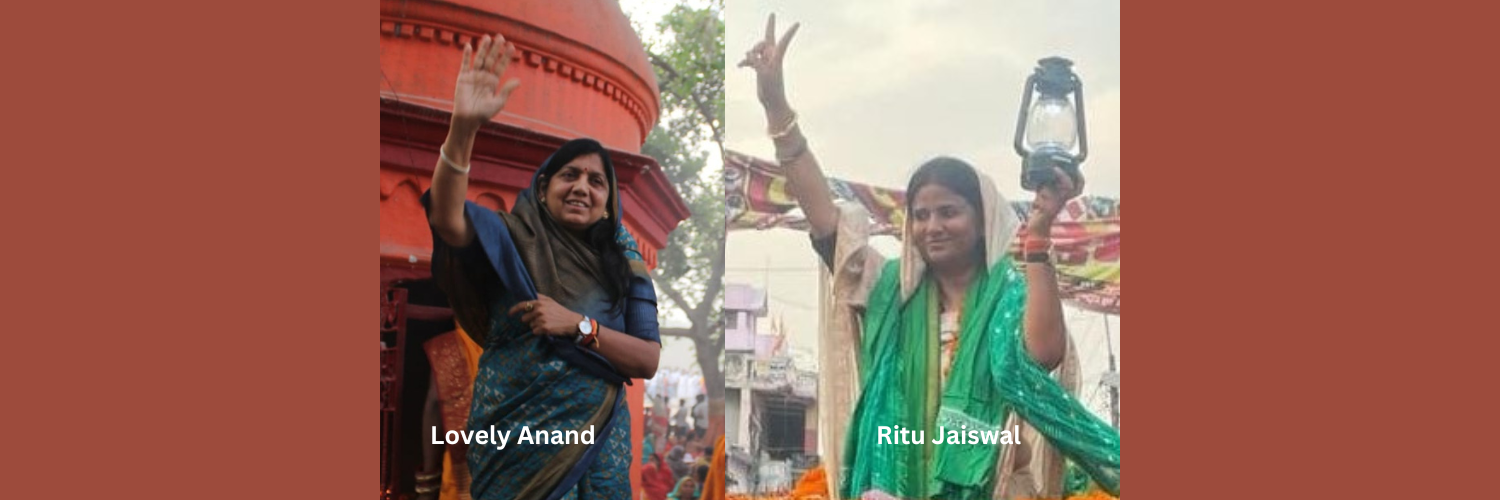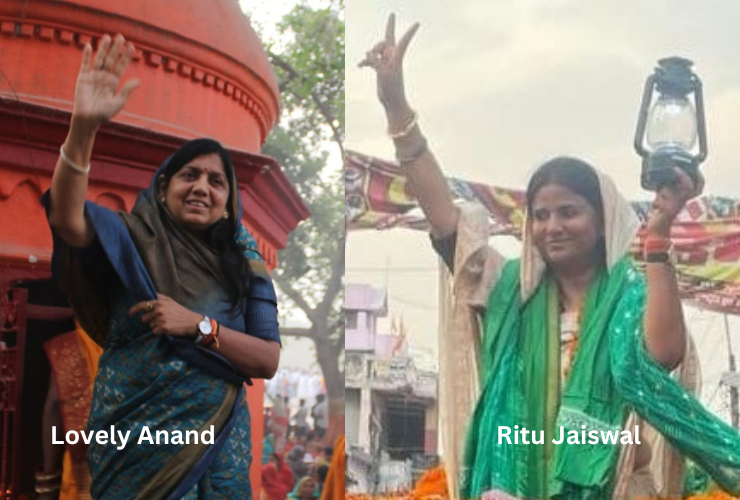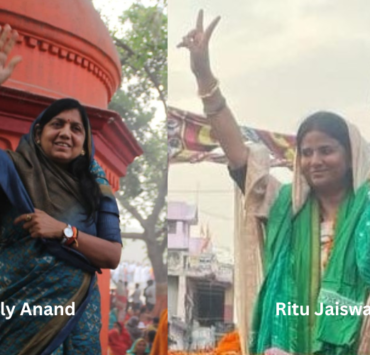
By Sumita Jaiswal

Though two women are in the fray and women leaders have been elected from the Sheohar Lok Sabha seat five times in the past, it is caste that is still pivotal in elections
The country has crossed the halfway mark in the 2024 Lok Sabha election, with four out of seven phases complete. With three more phases to go, campaigning is at a peak, and in Sheohar constituency in Bihar, which will vote in the sixth phase on 25 May, two women leaders—having very different backgrounds are doing battle. This is the first time two women are the main candidates in a Parliamentary election in the constituency. The Rashtriya Janata Dal (RJD), which is part of the Indian National Developmental Inclusive Alliance (INDIA), has fielded Ritu Jaiswal against Lovely Anand of the Janata Dal United (JDU), which is part of the National Democratic Alliance (NDA). In the past, the Bhartiya Janata Party (BJP) has won this seat three times.
Both women have been tagged “outsiders”. Jaiswal, an emerging leader from the Vaisya community, is known as a good orator, who can connect easily with people, and is popular for the work she has done as the mukhiya of the Singhvahini Panchayat in Sonbarsa block of Sitamarhi district, about 25km away from Sheohar. People recall the times she would visit flood victims and provide them relief materials, even wading through neck-deep water using a stick. A first-generation politician, she contested the Bihar assembly election from Sitamarhi in 2020 on an RJD ticket constituency and lost by a thin margin of a few hundred votes. A native of Sitamarhi, this is her first foray into Sheohar and the Lok Sabha election. On her campaigns, she takes pains to tell voters that she is no “outsider” as the two assembly constituencies of Sitamarhi fall within the Sheohar Parliamentary constituency.
Facing her is Lovely Anand, the wife of Bihar strongman Anand Mohan Singh, who was convicted for inciting a mob that murdered Dalit IAS officer and then Gopalganj district magistrate, G. Krishnaiah, in 1994. Last year, Anand Mohan Singh was released from jail after 16 years, when Bihar chief minister Nitish Kumar amended the prison manual and removed a clause, paving the way for his early release. A native of Saharsa district, about 200km from Sheohar, Anand Mohan Singh has represented Sheohar on a JDU ticket twice in the past, in 1996 and 1998. He was also elected MLA from Mahishi constituency of Saharsha district in 1990, representing JDU. Lovely Anand, from the upper caste Rajput community, has been represented from Vaishali in the Lok Sabha once, and has been voted MLA twice, from Barh and Nabinagar assembly constituencies. She has unsuccessfully contested from Sheohar before—in the 2009 and 2014 general elections for the Congress and Samajwadi Party, respectively, and the 2015 state assembly election.
Campaigning in Dumri Katsari block of Sheohar on a day when the temperature touched 41 degrees Celsisus, Jaiswal walked from door to door after addressing a public meeting, chatting with groups of women and visiting the home of the local mukhiya. Jaiswal is convinced that education and economic empowerment are the cornerstone of women’s equality. “Even if a woman brings a small amount of money home, she can make a big change,” she said. She is certain that women politicians who are working on the ground should get tickets. “Sometimes parties field popular actors, singers or cricketers, which compromises the quality of leadership. It is not necessary that a good actor or cricketer will be a good politician. They are often too busy in their respective field to give time to the people of their constituency, and this eventually impacts the development of the constituency,” she says.
Lovely Anand was less forthcoming—I tried to reach out to her several times but was rebuffed.
CASTE HOLDS SWAY
In Sheohar Lok Sabha constituency, about 25% of voters are Vaisya, 20% Extremely Backward Class, 20% SC & ST, 18% Muslim and 17% upper caste (predominantly Rajput) voters, according to a recent report in The Hindu. As per the latest data from the district election office, Sheohar has 18.25 lakh voters of which 9.63 lakh are male and 7.4 lakh female. It comprises six assembly constituencies—Chiraia, Riga, Madhuban, Dhaka, Belsand and Sheohar.
Sheohar has sent a woman to Parliament in the last three general elections in 2009, 2014 and 2019—Rama Devi, wife of the late muscleman Brij Bihari Prasad, who represents the BJP and is from the Vaisya community. Brij Bihari Prasad was part of former chief minister Rabri Devi’s cabinet. In 2022, Rama Devi alleged that Lalu Yadav’s family had her husband killed in 1998 as they feared his popularity. Rama Devi, the sitting MP, will not represent the constituency this time as the seat went to the JDU in the seat-sharing arrangement with the NDA. This has triggered resentment among the Vaisya community, which feels their political representation is at stake.
The constituency has been represented by a woman twice before—veteran Congress member Ram Dulari Sinha, who won both in 1980 and 1984. Sinha was a Union minister, the first woman governor from Bihar, a freedom fighter, and the first woman in Bihar to hold a master’s degree.
Though women leaders have been elected from this constituency five times in the past and two women leaders are in the fray this time, it is caste that still plays a role in elections and not women’s empowerment, participation or equal representation. Patna-based social activist and founder of Equity Foundation Neena Srivastava says women’s participation in politics is not enough to strengthen gender discourse in society. Political parties should demonstrate the will to promote women’s rights and equality.
A senior local journalist, on condition of anonymity, said, “Apart from the state government schemes for girls and women, I have not seen any work being done to promote gender equality. This time, we are seeing a close contest between two women candidates, and once again Sheohar is likely to be represented by a woman. Hopefully, she will bring new plans for the new generation.”
Mukesh Chaudhary, a BJP worker from Sheohar, says only four candidates from the Vaisya community have been fielded by various political parties in this election in Bihar. Delhi-based political analyst Arvind Sharma says the BJP has failed to understand the sentiments of the Vaisya community, which is its core vote bank. This could also affect the results in the seats surrounding Sheohar, he says. Local journalist Niraj says there is also resentment against the sitting MLA Chetan Anand, Lovely Anand’s son, which could impact her chances. Voters complain that he is inaccessible, has a feudal attitude, and does not care for the development of the district.
Despite these gaps and complaints, the battle between the RJD and JDU will be a close one. Both parties are playing the caste card, with JDU’s Lovely Anand openly wooing the Rajputs. Jaiswal of the RJD is focusing on the Vaisya community’s votes while talking about the “holistic development of Sheohar” to all communities.
At present, the tide seems to favour Jaiswal, who is known for her work as a mukhiya. Santosh Kumar, who lives in Tariyani block in the constituency, says, “The Vaisya community MPs have gone down over the years from four to one. We need to think about that when we vote.” Two youngsters, Raushan Kumar and Vimlesh Kumar, chime in to say their vote would go to the BJP but had no answer when asked the name of the candidate representing the party.
Pandit Sanjeet Bhartiya, a pujari of the famous Shiv temple Devkulidham, 5km from Sheohar town, said the community would hold a meeting to decide who they would support. “Ritu Jaiswal has done a lot of good developmental works in her area. We will vote irrespective of caste and political loyalties,” he said.
A young homeopathy doctor, Chandrajeet Singh, sums it up best when he says, “This time there is a close contest. Of course, caste is a big factor, but when the star campaigners come, it will become clear whether people will go with caste or party.”
Sumita Jaiswal is a senior journalist and fact-check trainer with 22 years of experience. She is currently based in Siliguri where she works for Dainik Jagran.
Edited by Shalini Umachandran
Please find the Hindi version here




